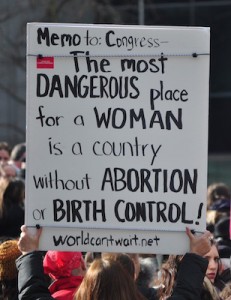What Will You Pay For An Abortion?
How much can an abortion cost in a country where it is illegal, and a punishable crime? Four weeks, three months and two days shows just how high the price can be.
It’s 1987. Gabita, a young student in Romania needs an abortion. Her best friend and roommate Otilla, agrees to help her. They could go to jail for this, but they decide to take the risk. The young women rent a hotel room, and scout out an abortionist known to all as Mr. Bebe. They’ve managed to borrow 3000 Lei, but Mr. Bebe’s price for the abortion – a risk he blames on Gabita “fooling around” – is something wholly unexpected. He agrees to perform the abortion if he can have sex with both women. In a very intense scene Gabita pleads that he let Otilla go, but in the end Otilla agrees to do it for her friend. Unfortunately due to a copyright issue, I cannot share the clip with you.
 It’s no secret that women are vulnerable in a country where the law does not take their needs into consideration. But Four weeks, three months and two days startled me! Packed with powerful performances from the lead cast, the movie takes you into the heart of nation where every movement is watched with suspicion, unwed mothers are unwelcome, and where abortion is taboo. Gabita is afraid of losing her place in the university once the pregnancy become obvious, and Otilla lets the abortionist rape her, so that her friend can carry on with her life. As it turns out, Gabita’s abortion in the movie is safe, and Otilla manages to get rid of the product of conception unnoticed. But the film ends with both women silently and sharing a meal after agreeing never to mention this incident. Their sense of relief is peppered with shame and fear.
It’s no secret that women are vulnerable in a country where the law does not take their needs into consideration. But Four weeks, three months and two days startled me! Packed with powerful performances from the lead cast, the movie takes you into the heart of nation where every movement is watched with suspicion, unwed mothers are unwelcome, and where abortion is taboo. Gabita is afraid of losing her place in the university once the pregnancy become obvious, and Otilla lets the abortionist rape her, so that her friend can carry on with her life. As it turns out, Gabita’s abortion in the movie is safe, and Otilla manages to get rid of the product of conception unnoticed. But the film ends with both women silently and sharing a meal after agreeing never to mention this incident. Their sense of relief is peppered with shame and fear.
The film — based on a true incident — shows just how vulnerable women are when one of their basic needs is a criminal offense. But it is not only in such countries that vulnerable women are exploited. In several countries across Asia, abortion black markets thrive solely because abortion is banned under the law. There are several providers — who may not always be doctors, though they might have trained in safe abortion techniques — charge exorbitant amounts for an abortion. Inna Hudaya, the founder and director of Samsara wrote for ASAP about such abortions in Indonesia. (Read her article here). Dr. S.P. Chong ASAP”s Steering Committee Chair spoke to us about similar situations in Malaysia. (Read his interview here)
Unfortunately even in countries where abortion is legal, it is not yet offered as a cheap and affordable procedure. Earlier this year, Dr. Indira Basnett, ASAP’s Steering Committee member in Nepal, spoke to us about affordability as a barrier to women seeking abortions in that country, in spite of its liberal abortion law. She is also the director of Ipas Nepal, which is currently working with the government to reduce the price of abortion in Nepal.
Stigma can be blamed for the fact that abortion is not yet a cheap or even free procedure offered at all health centers to all women who need them. It is not uncommon for people to think that women might use abortion as an alternative to contraception. But that is a matter of personal choice, and that a government cannot manipulate such a choice by banning the procedure all together or by placing a price on a service. Read our article about safe but expensive abortions.






